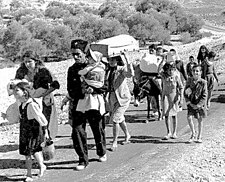 |
| Part of a series on the |
| Nakba |
|---|
During the 1948 Palestine war in which the State of Israel was established, around 700,000[fn 1] Palestinian Arabs, or 85% of the total population of the territory Israel captured, were expelled or fled from their homes.[1] The causes of this mass displacement have been a matter of dispute, though today most scholars consider that the majority of Palestinians were directly expelled or else fled due to fear.
Causes of the exodus include direct expulsions by Israeli forces, destruction of Arab villages, psychological warfare including terrorism, dozens of massacres which caused many to flee out of fear, such as the widely publicized Deir Yassin massacre,[2] crop burning,[3][4] typhoid epidemics in some areas caused by Israeli well-poisoning,[5] and the collapse of Palestinian leadership including the demoralizing impact of wealthier classes fleeing.[6] Many historians consider that the events of 1948 were an instance of ethnic cleansing.
Cite error: There are <ref group=fn> tags on this page, but the references will not show without a {{reflist|group=fn}} template (see the help page).
- ^ Morris 2001, pp. 252–258.
- ^ Morris, Benny (2004). The Birth of the Palestinian Refugee Problem Revisited. Cambridge University Press. ISBN 978-0-521-81120-0.
- ^ Pappe, I. (1999). Were they expelled?: The history, historiography and relevance of the Palestinian refugee problem. In G. Karmi & E. Cotran (Eds.), The Palestinian exodus, 1948–1988(pp. 37–61). London: Ithaca Press — "Where expulsion failed, transfer was encouraged, by every possible means (even by setting fire to the fields of Palestinian villages considered wealthy or by cutting water supply to city neighborhoods). Weitz convinced the Israeli government in May 1948 to confiscate any looted Arab harvest for the needs of the newly born state. This policy of burning fields or confiscating them continued throughout the summer of 1948."
- ^ Morris 2004 "While before May, burning Arab crops was mainly a Haganah means of retaliation for Arab attacks, during May–June the destruction of the fields hardened into a set policy designed to demoralise the villagers, hurt them economically and, perhaps, precipitate their exodus."
- ^ Benny Morris, Benjamin Z. Kedar, 'Cast thy bread': Israeli biological warfare during the 1948 War Archived 5 March 2023 at the Wayback Machine Middle Eastern Studies 19 September 2022, pages =1-25 p.8:'The SHAI, in its report from the end of June 1948 on the causes of the Arab flight from Palestine, mentioned ‘the typhus epidemic’ as ‘an exacerbating factor in the evacuation’ in certain areas. ‘More than the disease itself, it was the panic induced by the rumours of the spread of the disease in the area that was a factor in the evacuation’, stated the report. In its site-by-site breakdown of the Arab flight, the report mentioned ‘harassment [by the Haganah] and the typhus epidemic’ as the causes of the partial exodus of the population from Acre on 6 May.'
- ^ J.P.D. Dunbabin, The Post-Imperial Age: The Great Powers and the Wider World, Archived 8 October 2022 at the Wayback Machine Routledge 2014 ISBN 978-1-317-89293-9 pp.256-258.